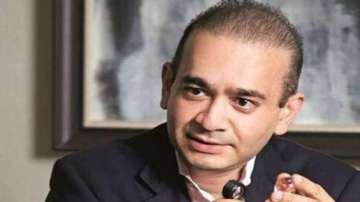UK High Court grants Nirav Modi permission to appeal against extradition on mental health grounds
A UK High Court judge here on Monday granted fugitive diamond merchant Nirav Modi permission to appeal against a magistrates’ court order in favour of extradition to India to face charges of fraud and money laundering before the Indian courts on mental health and human rights grounds.

A UK High Court judge here on Monday granted fugitive diamond merchant Nirav Modi permission to appeal against a magistrates’ court order in favour of extradition to India to face charges of fraud and money laundering before the Indian courts on mental health and human rights grounds.
Justice Martin Chamberlain delivered his verdict remotely under COVID-19 rules to conclude that the arguments presented by the 50-year-old diamond merchant’s legal team concerning his “severe depression” and “high risk of suicide” were arguable at a substantial hearing.
He also noted that the adequacy of the measures capable of preventing “successful suicide attempts” at Mumbai’s Arthur Road Jail, where he is to be detained upon extradition, also fall within the arguable ambit.
“At this stage, the question for me is simply whether the appellant’s case on these grounds is reasonably arguable. In my judgment, it is. I will grant permission to appeal on Grounds 3 and 4,” Justice Chamberlain’s ruling notes.
Grounds 3 and 4 relate to Article 3 of the European Convention of Human Rights (ECHR), or the right to life, liberty and security, and Section 91 of the UK’s Criminal Justice Act 2003 related to fitness to plead.
The judge notes an overlap between both grounds as they both rely principally on the appellant, Nirav Modi's, mental ill health.
READ MORE: UK High Court rejects Nirav Modi's extradition plea, has 5 days to appeal for oral hearing
“I will not restrict the basis on which those grounds can be argued, though it seems to me that there should be a particular focus on whether the judge was wrong to reach the conclusion he did, given the evidence as to the severity of the appellant’s (Nirav Modi’s) depression, the high risk of suicide and the adequacy of any measures capable of preventing successful suicide attempts in Arthur Road prison,” the ruling notes.
Under Article 3 of the ECHR, to which the UK remains a signatory, an individual cannot be extradited if it would be unjust or oppressive to do so, also used in the case of Wikileaks founder Julian Assange earlier this year.
Permission to appeal on all other grounds was declined and the case will now proceed for a substantive hearing before the High Court in London under Grounds 3 and 4.
At a remote hearing on July 21, Nirav’s counsel Edward Fitzgerald QC had argued that District Judge Sam Goozee’s February order in favour of extradition was wrong to hold that there was “nothing unusual” about his mental condition and wrong to focus on only his present fitness to plead.
“The judge was wrong to discount the high risk of suicide on the basis that it was not ‘immediate’,” Fitzgerald had argued.
Crown Prosecution Service (CPS) barrister Helen Malcolm QC, arguing on behalf of the Indian authorities, had countered to reiterate the assurances provided by the Indian government of adequate mental health care for the accused on being extradited to an Indian prison.
“The premise for the judge’s approach was the existence of a serious condition which required management, which is why the judge had regard to the assurances,” she said.
In making his ruling, Justice Chamberlain notes that the defence relied on new evidence by Nirav Modi’s solicitor Anand Doobay during the appeal hearing, highlighting a resurgence of coronavirus in India which would impact the care available to him in prison.
“The admissibility of the evidence of Mr Doobay will be a matter for the court considering the substantive appeal,” he concludes.
Meanwhile, all other grounds raised by the defence, including the admissibility of evidence provided by the Enforcement Directorate (ED) and the Central Bureau of Investigation (CBI), were dismissed.
“The judge’s approach to the identification of a prima facie case was correct. Given the test he had to apply, and the volume of evidence relied upon against the appellant, he was entitled to conclude that each of the requests disclosed a prima facie case,” the High Court ruling notes.
The diamond merchant, wanted in India to face charges of fraud and money laundering in the estimated USD 2-billion Punjab National Bank (PNB) scam case, meanwhile remains at Wandsworth Prison in south-west London.
The High Court ruling related to his mental health paves the way for another attempt at an application for bail, which has been turned down at numerous occasions previously despite the offer of 4 million pounds security.
Nirav Modi is the subject of two sets of criminal proceedings, with the CBI case relating to a large-scale fraud upon the PNB through the fraudulent obtaining of letters of undertaking (LoUs) or loan agreements, and the ED case relating to the laundering of the proceeds of that fraud.
He also faces two additional charges of "causing the disappearance of evidence" and intimidating witnesses or “criminal intimidation to cause death”, which were added to the CBI case.
India is a designated Part 2 country by virtue of the Extradition Act 2003, which means it is the UK Cabinet minister who has the authority to order a requested person’s extradition after all legal issues are dealt with in the courts.
The High Court ruling also found that Home Secretary Priti Patel had "adequate" grounds to accept the Westminster Magistrates' Court ruling and sign off on the extradition in April.
READ MORE: Nirav Modi's sister sends Rs 17.25 crore from UK account to Indian govt: ED